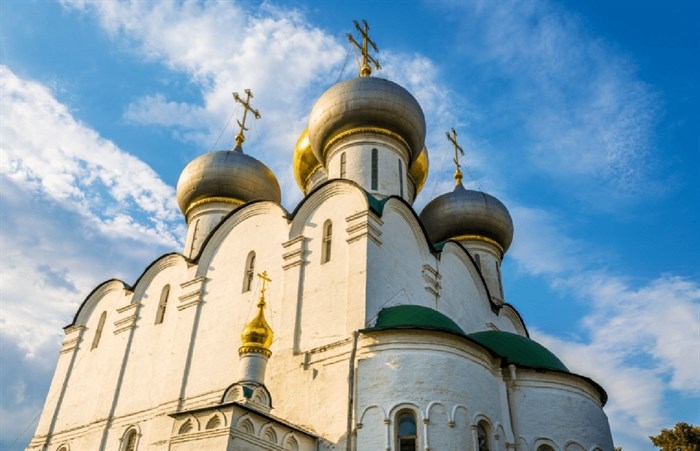
Canada has a large community that traces its heritage to Russia, dating back to the 18th century. Unfortunately, many heritage sites have been vandalized and Russian-Canadians harassed in the wake of the Russian invasion of Ukraine.
Image Credit: (Leonid Andronov/canva)
March 29, 2022 - 7:00 PM
Julia Burakova, a Canadian citizen of Russian heritage, says she has already faced harassment and hate speech on three specific occasions since the invasion of Ukraine on Feb. 24. She is deeply saddened by the war.
Burakova, a photographer, immigrated to Canada 12 years ago in search of safety and a better life. But, she says, today, she feels unsettled and not in the right mind, given the harassment she’s experienced.
Sitting in a Vancouver, B.C., coffee shop, Burakova speaks in a low voice to avoid being overheard as having a Russian accent for fear of being harassed. Recounting one of the latest instances, she says she was approached by an angry mother who told her she “should burn in hell.” The outburst happened at a playground where she regularly takes her children in Coquitlam-Metro Vancouver.
In another instance, she recalls someone telling her and her family they should be “ashamed to be Russian” simply because they had overheard them speaking Russian while taking a stroll.
“We are totally stressed out. We do not believe what is going on,” she says.
Russian heritage sites vandalized
Russians have immigrated to Canada since the late 18th century, with over 620,000 Canadians saying they are of Russian origin. As the war in Ukraine continues, many long-established heritage sites, communities and businesses have been targeted.
On March 5, for example, the Russian Community Centre (RCC) in Kitsilano, B.C, established in 1956 as a cultural and social hub with no political affiliations, had its doors vandalized with yellow and blue paint, the colours of the Ukrainian flag.
In an interview with NCM, Ariadna McKenna, chair of the Centres’ board, expressed frustration at the vandalism, particularly as the centre has both Russian-Canadian and Ukrainian-Canadian members.
“I’m unsure why this happened. I can only assume someone who was targeting the Russian Community Centre is a supporter of Ukraine. What they don’t understand is that our membership has a large percentage of Ukrainians,” McKenna said.
McKenna further noted that while she knows of incidents of harassment based on media reports, she’s “not aware of specific instances within our membership.”
However, she adds, there “likely have been” cases.
New Canadian Media contacted Vancouver Police to ask about updates regarding the investigation, but did not hear back.
The St. Sophia’s Orthodox Church in Victoria was also vandalized with red paint thrown on its front doors. That is the second church targeted after another one was vandalized in Calgary, Alberta.
Following the Calgary incident, the All Saints Russian Orthodox Church called for people not to sow division and hatred in the wake of the war.
Stories of bullying
Of the three other Russian-Canadians NCM spoke with about the harassment they’ve experienced, only one person agreed to share it publicly, provided their real name is not used to avoid further attacks.
Anna (not her real name), for instance, says her 15-year-old son was bullied in school by other students who were shouting at him, telling him “we are praying for the death of [Russian President] Vladimir Putin.”
After visiting the school to address her son’s bullying, Anna says she found out another student of Russian background had been transferred to another school by his parents as a result of the bullying.
Online harassment
Online harassment on social media platforms targeting members of the Russian community have also increased.
On March 3, CTV News reported that Calgary Police were ”investigating multiple reports of online harassment on a social media platform targeting members of the Russian-Calgarian community.”
Others, like Burakova, have faced an onslaught of hate emails, phone calls and online comments because of their support for Ukrainians.
Burakova, for instance, says she was verbally attacked by other photographers after she had suggested coordinating a drive to send money to Ukraine.
“They refused my support and instead they used many swear words,” she says.
In another instance, a group of some 5,000 Russians and Ukrainian mothers who had joined a Facebook account to share their ideas about Russian motherhood, culture, and society, quickly devolved into verbal attacks after some of them mentioned the current invasion.
Victims of media coverage
Burakova believes that a lot of the harassment hurled at Russian-Canadians stems from the skewed coverage of the events by both Russian and Western media outlets.
“There is a new European wave of aggressive media against us,” she says. “They show a negative image of us as enemies of Ukraine … [even though] we support Ukrainians and denounce Putin’s war.”
On the other hand, she says, Russia’s propaganda has led many Russians to believe they are fighting to protect Ukrainians.
To her, both sides are wrong, aggressive and fanning the flames of hatred through their self-interested coverage.
Editor’s note: Professional and ethical journalism guidelines state that all claims must be corroborated and backed up by evidence and credible sources who are clearly identified. However, this isn’t always possible to do when security and safety issues, for instance, are at play. Please, take a look at this guide published by NCM to learn more about the ethics behind naming sources and using anonymous ones.
— This story was originally published by New Canadian Media.
News from © iNFOnews, 2022